

Sales can be one of the most terrifying words in the English language. If one happens to be a creative professional, let’s just multiply that fear level by ten…or a thousand.
In fact, many writers spent decades longing to sign with legacy publishers for the sole reason that they believed a major publisher would tend to all that vulgar sales business for them so they could simply write and create!
*clutches sides laughing*
It’s cool. I once thought the same. We’re all friends and philistines here 😛 .
The first hard truth is that, even if we are fortunate enough to score a contract with a major publisher (scant few that remain), if our book doesn’t sell, the publisher will eventually have to cut their losses (‘losses’ being code for ‘writers who fail to sell enough books’).
Second hard truth? In the modern publishing era, Big Six Publishing has been replaced with self-publishing, indie publishing and smaller, more efficient boutique publishers. Again, building a brand and book sales will largely be on the author.
Regardless of size, publishers are businesses not charities, and throwing good money after bad is better left to Hollywood. This said, the idea of having to ‘do sales’ is still enough to make many creatives break out in hives.
Which is why I am here to help.
Deep Breaths
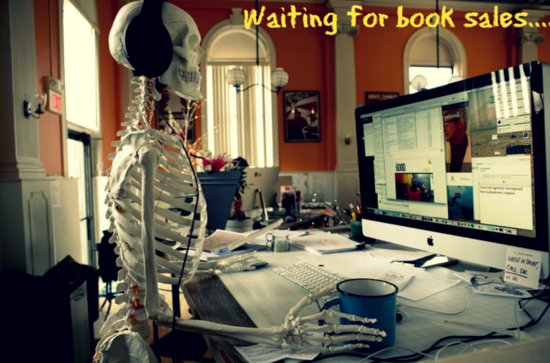

We writers have a nasty habit of black-and-white thinking in regards to sales. In our minds, there are only TWO approaches to selling.
One approach is to be on every single social site running marketing blitzes, promotional campaigns, holding contests, and blasting people with emails/newsletters until they buy a book…or file for a restraining order.
The other option is we never tell anyone we’re an author or—GASP—that we have a book(s) for sale. Short of applying for WITSEC, we do everything and anything to hide that we’re a writer, including our NAME (refer to The Problem with Pen Names).
In an effort to avoid ‘sales’ we pretty much guarantee we’ll never sell any books…thus fulfilling the societal assumption that writers are all broke losers.
***We’ll tackle that bugaboo later.
I believe most writers are afraid of sales because they don’t understand what sales actually IS. Remember, we writers are in the entertainment business. Notice half that word is business and I dare you to name any business that will last very long without any sales.
And before y’all have a panic attack, what’s the title we authors covet most? New York Times Best Selling Author. Notice the title isn’t New York Times Best Writing Author.
Even though it should be *grumbles*.
Cuz, Baby Things Change…
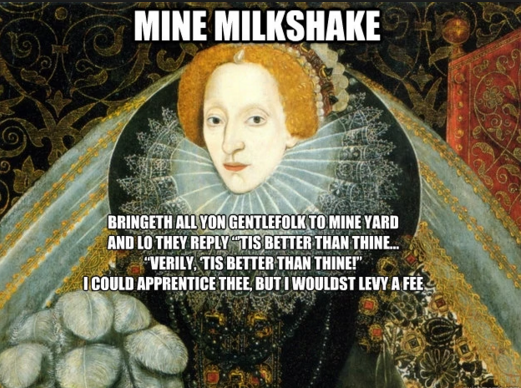

Before we tackle misconceptions about sales, I want to point out that we’re no longer in the 20th century. I know, time flies, right? The audience (customer base) of 2021 has evolved and what worked in the 90s no longer works today. Doing MORE of what doesn’t work is…well, stupid.
Alas, I cannot count how many sales books, training programs, etc. still push tactics that are over twenty years out of date.
Our customers (code for ‘readers’) have evolved, which means sales, promotion, marketing, branding, etc. must evolve as well or it will be virtually impossible to create meaningful connections that yield results.
Think of the English language. Have you ever tried to read the original Beowulf in Old English? To spare your eyes and WordPress from a cascading font meltdown, just listen to this (below) for 15 seconds.
Or five.
YES, THIS IS ENGLISH! Brought to us courtesy of Realm of History who apparently got someone drunk enough to be able to pronounce the words properly (as if anyone other than the ridiculously brilliant Cait Reynolds would correct them *rolling eyes*)…
[embedded content]
Can you imagine if we tried to hold a conversation speaking this way? Good luck getting a date, a job, or ordering a hamburger.
If the world has evolved, we’re wise to keep pace.
Sales Has NOT Evolved…Much
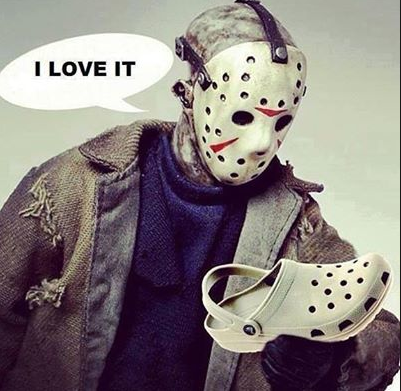

This profession is as old as time. In fact, sales has been around since Og first realized others wanted the pointy sticks he’d become rather adept at crafting. #TrueStoryIJustMadeUp
Once Og grasped that others were willing to give him berries, nuts, and shiny rocks in exchange for one of his pointy sticks, the concept of business/trade emerged and an entrepreneur was born!
Og, being the clever Homo ergaster he was, eventually realized a fellow tribe member might even offer a couple of hot daughters in exchange for a large order of extra-pointy sticks. So, he recruited his drinking buddies Ag and Ug to help.
In doing this, Og unwittingly discovered scalability.
Og understood that, the more pointy sticks he could fashion and the pointier the pointy stick, the better. This meant he also needed to find ways to let others know about his pointy sticks. Maybe even demonstrate some advantages of owning a pointy stick on say a fish, a squirrel, or an annoying member of the tribe.
Welcome to SALES!
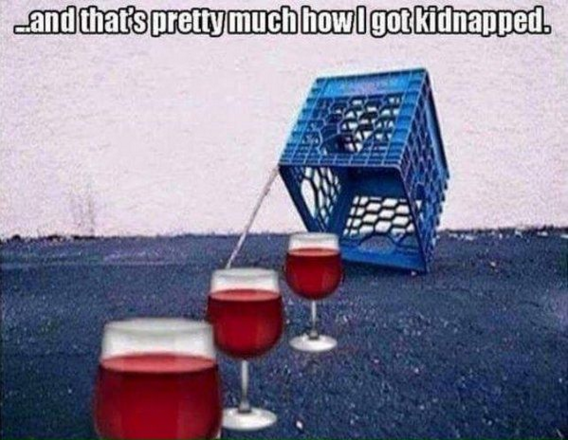

Once we appreciate sales has been around since the dawn of time and is vital and necessary, we can relax a little…or a lot. While sales in and of itself is a permanent societal fixture, tactics have to evolve. Don’t believe me? Try stabbing an annoying neighbor to demonstrate that knife you’re trying to sell and…point made.
*Bada bump snare*
Now that we’ve settled that sales is a good thing that’s here to stay, let’s do some myth-busting. I feel once we separate facts from fiction, it will be far easier to face our fears.
***Bonus points there for alliteration 😛 .
Myth #1: The high-pressure, fast-talking, aggressive personality is necessary to be good at sales.
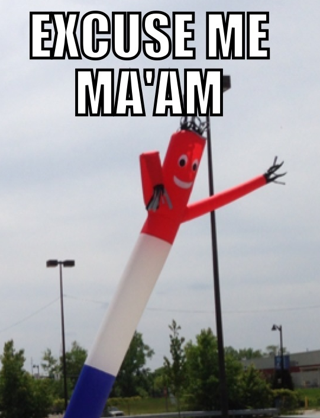

Wrong.
There seems to be this cultural idea of what ‘personality’ is required in order to be successful in sales. Usually this is the fast-talking, Type A ‘extrovert’ willing to pummel any prospect into a purchase.
This is total bull sprinkles.
Yes, this type of salesperson exists and, odds are, we’ve all run into one…then run away from one. Good news is we’re now in the digital age.
The high-pressure, fast-talking, aggressive salesperson is a relic best left in the 90s with shoulder pads, fanny packs, the McPizza…and these things.


In the old days, badgering had no consequences. Now? We now can unfriend, unfollow, block, and unsubscribe. Or, if nothing else works, we can post on social media that this business or product is to be avoided more than The Black Death pandering a litter of rabid kittens in need of a loving home.
Myth #2: Salespeople Sell Stuff & Good Salespeople Sell A LOT of Stuff
Yeah, no. Not exactly.
Salespeople solve problems. Good salespeople solve a lot of problems or solve bigger problems.
That’s it.
The better a person solves problems, the more money they make. Why? Because happy customers LOVE to share a win because it makes us feel super smart, and we like to brag. Also, humans dig being helpful.
This is called ‘word-of-mouth.’
Simple.
Why so many ‘sales tactics’ fail is the seller fixates on selling the product (their needs) instead of focusing on the best way to solve problems (the consumer’s needs).
I get that newsletters, automation, and email marketing are all the rage. Somewhere, somehow my business email was rufied and taken hostage. I’m relentlessly bombarded with emails from authors (or ‘PR firms’ representing authors) all wanting something FROM ME.
Read MY FREE book. Review MY FREE novel. Share MY FREE series with YOUR friends!
This is NOT SALES.


Sales is when someone solves my problems, not when some stranger ambushes me to solve a long@$$ list of their problems.
Some random writer’s lackluster sales are NOT my problem. When the author (or their ‘PR firm’) craps up my email with fresh lists of demands guised as doing me some kind of a favor (I.e. Offering ME a chance to interview THEM about THEIR BOOK…on MY BLOG?)…
*deep cleansing breaths* ….they’re not a solution to ANY of my problems.
They’re an additional problem.
Because when I get an average of twelve of these kinds of emails a day, it makes it a bugger to find messages salient to doing my job. This doesn’t make me want to buy their books.
It makes me want to save that money to fund anyone willing to develop technology that delivers a non-lethal but painful electrical shock to anyone who spams me.
Myth #3: More is MORE
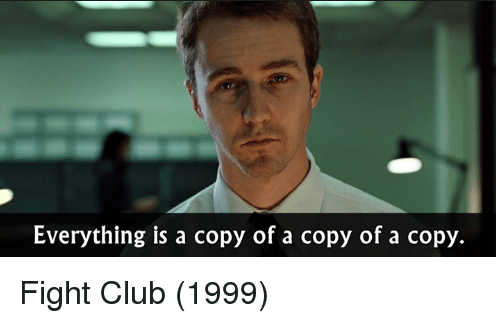

I mentioned earlier that we were no longer in the 20th century, but many marketers and promoters simply don’t grasp this. Or they don’t care to because being lazy and uncreative is easier.
See, it wasn’t until the late 90s and early aughts that computers and laser printers lowered the barrier to entry for businesses who wanted to use printed material for advertising.
This might seem like no big deal, but Kinko’s (and their ilk) started a small trend that’s turned into an unrelenting MONSTER—direct marketing.
Y’all have to understand that, before roughly 1998, printing was ridiculously expensive. Only big companies with massive budgets could afford to print anything on a large scale.
***This is why business cards used to actually impress people. Also, if you lost your cat, you only put up fliers if you liked (or feared) that cat…a lot.


Anyway, cheap printing breathed life into the golem we know as direct marketing (a.k.a. junk mail). Then, once more people owned computers and used email, direct marketing simply migrated to another place to bug the $#@! out of us.
Now? Social media is experiencing this same devolution. Too many authors (mistakenly) believe they need to be on all sites all the time to sell, sell, sell which is why there’s so much automation.
But riddle me this.
If we didn’t want the spam served as paper in our mailbox, and we didn’t want it served virtually in our email, why would it magically become appealing when plastered on our Facebook wall?
Hint: It isn’t.
Capitalism 101
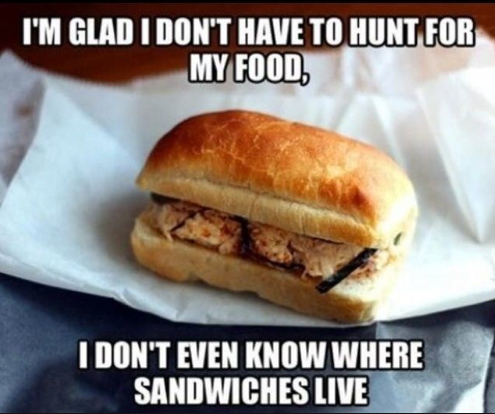

We live in an age with countless choices, unlimited options, lower and lower prices, and in every color we could want. Even with SPARKLES! Cheap and FREE are invasive species glomming up the business ecosystem and making us all sick.
To succeed in any business, the goal is not to replicate what’s already abundant, but rather to take time and zero in on what is scarce.
So what’s scarce? For the sake of brevity I’ll name a biggie.
Trust
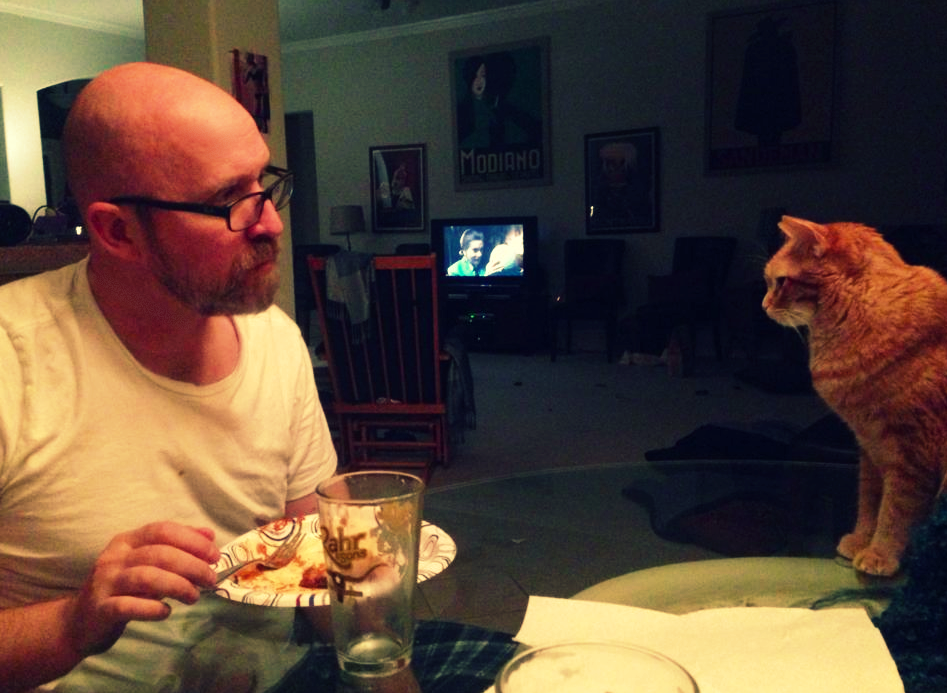

All brands, businesses, services and products must earn the customer’s trust. The reason spamming ‘readers’ with free books is so ineffective is that FREE alone is insufficient to close the trust gap, especially in areas the customer stands to lose more than they gain.
There are many instances where FREE has zero impact and perhaps a negative impact on the purchase decision.
For example, would you hire a nanny to watch your children while you went to work because she offered her first week on the job FREE? A new skydiving business opens and first jump from 16,000 feet is FREE! New tattoo artist, and first tattoo is FREE!
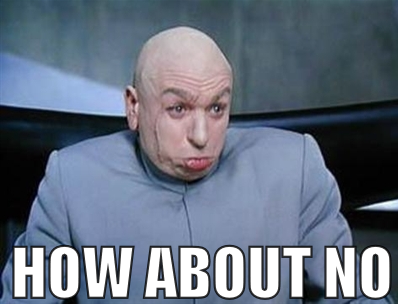

Granted, my examples sound crazy but why is FREE not super valuable in these instances? Because whoever is offering the FREE product or service is a stranger we don’t know or trust. We (customers) also stand to lose more than we gain. This is the important difference when considering FREE as a sales strategy.
The COST of FREE
If I’m in the store and a smiling rep offers me FREE a sample of sparkling juice, cool! Costs me nothing and the worst case is I dislike the taste. But, when an author who’s never so much as said hello to me offers me a FREE book, this costs my most valuable resource and the one that’s nonrenewable.
TIME.
And, since the book is being handed out to total strangers FREE, this makes me question why. If the book was actually good, why are they giving it away for nothing? This is when I deduce that FREE will cost me and I decline.
My decision might have been different had the author done something ahead of time to close the trust gap between us. This is why the social media platform and brand is essential if we hope to sell books. It’s also why I recommend authors having a blog. People get to know us, our voice, and see for themselves how well we write at least in one medium.
If we can hold an audience’s attention and show we have at least a basic understanding of the mechanics of writing, we’re already in a stronger position. A blog is free. It’s a pizza sample. The consumer gains more than they stand to lose and we begin establishing trust.
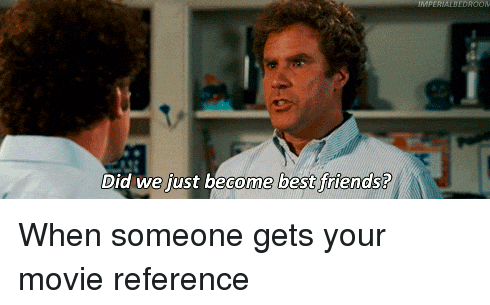

My opinion differs from others, and that’s fine. Some folks are naturally very adept at the old-school marketing and hard core sales tactics. As a creative? It isn’t a good fit for my personality, and the approach is one that must be constantly monitored.
Blogs, for instance, are evergreen (meaning they have a SUPER long shelf-life, unlike ads, tweets or FB posts). I have blogs so old I forgot I wrote them that attract new fans daily. Even though many of my posts are YEARS old, they’re still out there working for me.
My post What Went wrong with The Star Wars Prequels STILL attracts commenters even though the post was written ALMOST TEN YEARS AGO. I doubt anyone would ever discover me with a ten-year-old ad, tweet, or FB post. This is why it’s also vital to write more than one book and have a backlist. Odds are, if a reader enjoys one book, they’ll eat through all we have to offer.
Suffice to say, social media isn’t a new and improved way to spam people and push ads. Used properly, social media is one of the most powerful ways to close the trust gap between unknown author and potential readers by establishing then growing relationships.
Sales & Brand
If we stop and think about sales as a profession before direct marketing, what did it entail? A lot of taking customers to lunch, golfing, dinner parties. Essentially? True sales is about (and has ALWAYS been about) creating relationships. Done properly, the people one mingles with like us first, but they ALSO associate us with OUR product to solve THEIR problem.
Thus, when they need a book to download at the last minute when stranded at the airport, they (ideally) think of us.
This is where sales and brand merge together. What do people FEEL when they see our name?
Does our name evoke pleasant feelings or indigestion?
Too many authors, in a mad rush to promote, haven’t yet created rapport with their potential audience, and thus remain an unknown. The harder they market and the more they promote, the more they widen the trust gap into a trust chasm.
I know of many authors who are incredible with spreadsheets and marketing campaigns, and ads, and all of that is a wonderful skill. My point here is that too many get the proverbial cart ahead of the horse (hard-charging marketing) before establishing a relationship, and that is a formula for major burnout (especially for those of us who don’t have Excel in our DNA).
What is Our BUSINESS?


We writers are in the business of storytelling. Great stories are our business, our product and our single greatest selling tool. Outstanding books solve a lot of life’s problems.
Just ask anyone stuck in a doctor’s office, airport, or hospital with no wifi.
Humans LOVE stories. We are a story people. I love mysteries because they keep my brain and attention to detail sharp. Some folks want to experience the thrill of new love (romance), the adrenalin rush of the chase (suspense/thriller), or maybe retreat to a world of magic or far off galaxies. Real life, especially with COVID, is heavy, and fiction offers an escape, a place for catharsis, and even just plain fun.
It’s easy to believe that people just don’t read books anymore, but that’s hogwash. In our digital culture, audiences are hungrier than ever for content. They love blogs, binge on podcasts, and inhale audiobooks or read on their phones during long commutes. Netflix, Amazon and others in the movie industry are constantly on the hunt for books that can be made into new movies.
The best ‘sales strategy’ for selling a lot of books is to take the time, effort and money one might be tempted to pour into a steady stream of ‘promotional campaigns’ and write excellent stories instead. The product is essential. Write books people enjoy so much they can’t wait to share their experiences.
In between ‘life’ and on writing breaks, hop on-line and relax, get to know people, connect. Reach out to others via common interests. Get to know THEM. The best salespeople are authentically interested in others.
Ultimately, delighted readers are the best salesforce of all…and they not for sale 😉 .
What Are Your Thoughts?
Does this post make you feel a little bit better about sales? Clearer about what to DO on social media? Yes, it is OKAY to have fun and YES, post the kitten videos. It is also perfectly okay to advertise, promote and market…eventually.
Just that whole horse ahead of the cart thing.
I appreciate all your thoughts and love hearing your experiences. For those authors out there who ROCK the spreadsheets? I’m super jealous.
But for those like me who are more ‘ADHD meets nutty professor’ with lists for your lists and stacks for your stacks, take heart. You, too, can be good at sales if you always remember your book is solving a problem for your audience. If they want/need/crave magic? Give them MAGIC. They want love? Make them see hearts and sparkles. Do they long for adventure? Take them for a journey they’ll never forget.
Once you keep this core concept as your primary focus, sales is a lot more fun…or at least doesn’t make you want to hide in a closet weeping into a bowl of brownie batter 😀 .
Any thoughts, questions, concerns? I am happy to answer and might even write a post to help you out!
